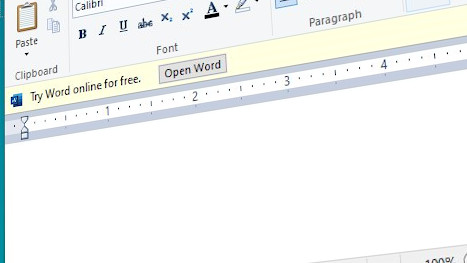Windows 11 bids farewell to WordPad as Microsoft axes longtime favorite (oh, and Cortana)
Microsoft axes WordPad, users await a possible resurrection

Microsoft finally gives its iconic WordPad app the chop as a new Windows 11 Canary build reveals that the long-time word processing app’s time is up. The Canary channel is one of four release channels in the Windows Insider Program, Microsoft’s community that gives testers, developers, and enthusiasts access to try out new versions of Windows and new features to gather feedback and improve them before releasing them to the wider user base.
In WordPad’s place, Microsoft is directing users to use Microsoft Word to work with rich text files, which feels a little cheeky (more about that in a moment).
We found out that WordPad was being deprecated a little while back, and now Microsoft is making good on its promises. The company elaborated that no new WordPad developments were being worked on at the time of the announcement, and that future Windows 11 releases wouldn’t include it - which is what has happened with the latest WordPad-less Canary build.
Microsoft also revealed that the WordPad and People apps won’t be included by default upon a clean install of Windows 11, and you’ll no longer be able to reinstall WordPad at a later date.

Users react
This development comes with a tinge of melancholy for many Windows fans because it has been one of Microsoft’s flagship programs for a long time. For many users, it was their preferred choice for a basic and straightforward simple rich text editor, being included in nearly every version of Windows starting with Windows 95.
Microsoft recommends “Microsoft Word for rich text documents like .doc and .rtf and Windows Notepad for plain text documents like .txt” for users who would like to know what to use instead.
Of course, the full version of Microsoft Word is part of the Microsoft Office suite, which isn’t free, so recommending a paid-for alternative to a free app they’ve just cut probably won’t go down too well. A much better alternative is LibreOffice Writer, which is part of the free, open-source LibreOffice suite - although I can imagine why Microsoft would be hesitant to send people to a free rival app.
Sign up for breaking news, reviews, opinion, top tech deals, and more.
The newest preview build, Windows 11 Insider Preview Build 26020, also saw a move that was long expected from Microsoft - giving Cortana the chop. If you’ve already forgotten what Cortana is (or, rather, was), Cortana is Microsoft’s previous effort in its mission to create a personal productivity assistant.
Now, it’s leaving Cortana in the past and trucking forward with Windows Copilot, its newer and fresher take on the all-purpose digital assistant that’s powered by AI. According to Tom’s Hardware, Microsoft is so keen to make Copilot a hit (unlike the rather unpopular Cortana), it is now requiring partner keyboard manufacturers to have a dedicated Copilot key.
A final bow for WordPad - or is it?
To some, this move reminds them of when Microsoft wanted to ax Windows Paint. Many users were incensed, which is understandable, in my opinion, as I think Paint is one of the best apps ever made. In the case of Paint, Microsoft actually listened to users’ outcry and made the app available for download from the Microsoft Store. Since then, it’s been developed and upgraded for Windows 11, and even getting its own AI assistant named Cocreator.
It’s speculated that if there’s enough uproar about WordPad’s departure, Microsoft might consider doing something similar for WordPad. WordPad is a quality, solid app that’s simple and straightforward, installed by default, quick to load and get going, and offers more features than NotePad for simple text editing.
It’s safe to say many users are lamenting WordPad’s exit and are hoping it’ll be made available as an optional download. I guess we’ll have to see if Microsoft is actually interested in continuing to give users the option to work more simply and without unwanted AI features, or if it really is committed to dropping popular basic apps in pursuit of its vision of an AI-powered future.
YOU MIGHT ALSO LIKE...
Kristina is a UK-based Computing Writer, and is interested in all things computing, software, tech, mathematics and science. Previously, she has written articles about popular culture, economics, and miscellaneous other topics.
She has a personal interest in the history of mathematics, science, and technology; in particular, she closely follows AI and philosophically-motivated discussions.